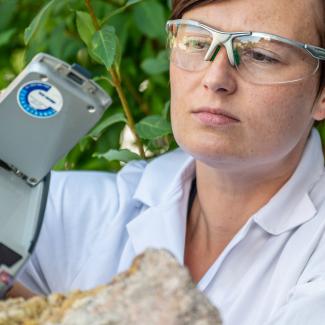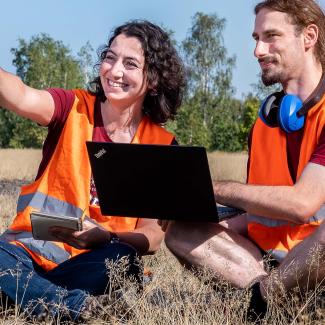Environmental Systems Science - Geoecology
Complex challenges require competent solution strategies
The current and future challenges of the climate crisis, the adaptation of land and resource use and the conservation of biodiversity require interdisciplinary skills at the highest level. The Bachelor's degree programme in Environmental Systems Science - Geoecology teaches scientific skills for tackling environmental problems at a local, regional and global level. We provide our students with a broad understanding of functions, processes and interactions in environmental systems as well as a comprehensive repertoire of analytical methods. This prepares our alumni to analyse and evaluate complex environmental issues using scientific methods and to develop solutions.
The degree programme in Freiberg is as diverse as the current and future environmental issues. The 3-year Bachelor's degree programme begins with students acquiring a networked basic knowledge of natural sciences, which they increasingly interweave and expand for an interdisciplinary environmental systems analysis. In the final semesters, students choose a system specialisation in which they examine sub-areas of the human-environmental system in depth, in an interdisciplinary and problem-solving-oriented manner. The study projects and specialisations can be individually designed depending on the student's personal focus. Practical insights, contact with future jobs and application of knowledge take place in a non-university work placement at the end of the degree programme. Regional, national and international networks can be used for the projects, the work placement and the final thesis.
Structure of the BSc Environmental Systems Science - Geoecology degree programme
The degree programme is divided into five content areas, the systems specialisation, the work placement and the Bachelor's thesis. The areas of mathematical and natural science fundamentals (M1), environmental systems science fundamentals (U1), applied environmental systems science (U2) and spatio-temporal data analysis and computer science (M2) are compulsory. The modules in the areas of social sciences and communication (GK) and system specialisations (SV) can be chosen according to individual interests.
The degree programme can be studied full-time or part-time. For part-time study, an individual study schedule is determined in consultation with the examination board.
- Faculty
-
Faculty of Geosciences, Geoengineering and Mining (Faculty 3)
- Degree
-
Bachelor of Science (B. Sc.)
- Standard period of study
-
6 Semester
- Part-time possible
-
Yes
- Start of studies
-
Winter semesterSummer semester
- Admission requirement
-
Abitur or subject-specific higher education entrance qualification or an entrance qualification recognised as equivalent
Language requirement
- Application: with at least B1 level German
- Admission to the degree program: with C1 level German (e.g. DSH-2)
- language courses and DSH exam at TUBAF
- Course language
-
German
The Bachelor's degree programme in Environmental Systems Science - Geoecology prepares students for careers in nature, environmental, climate, soil and water protection as well as in spatial planning and regional planning. With their interdisciplinary skills, alumni are suitable for jobs in engineering, consulting and planning offices, municipalities, state and federal authorities, teaching and research institutions, development cooperation organisations, (environmental) analytical laboratories, agricultural and forestry businesses as well as industrial and insurance companies.
Why study Environmental Systems Science - Geoecology at TUBAF?
The natural science degree programme in geoecology specialises in imparting interdisciplinary analytical skills and an interdisciplinary understanding of the functioning and effects of the atmosphere, biosphere, hydrosphere, pedosphere and lithosphere at various scales. A particular focus in Freiberg is on the areas of biogeochemical analysis and cross-scale hydrogeophysical methods. Beyond the subject area, students in Freiberg can deepen their own connections in the specialisations, e.g. to geoengineering and geoenergy systems, materials science, microbiology and industrial history, and thus become experts for the Anthropocene.
Interests and skills that you should bring with you
For studying natural sciences, an interest in analyses in the laboratory and in the field is just as important as not being afraid of maths, data and computers. If you want to understand the complexity of environmental systems and contribute to crisis solutions with analytical expertise, Environmental Systems Science - Geoecology is the right programme for you.
Information on further study programmes at TUBAF
The Master's degree programme in Geoecology builds directly on the Bachelor's degree programme and, following the rather broad introduction to environmental systems science, offers opportunities for subject specialisation and methodological in-depth study. The focus is on advanced field, laboratory and data analysis skills and their application in models for analysing complex environmental systems in transition.


